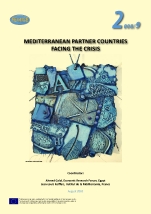Updated on 5/01/10
Femise has released its latest report on the Euromediterranean Partnership and the situation of the Mediterranean countries. The subject of this year’s report is to provide information about how the crisis is affecting the Mediterranean Countries.
To address these issues, this report will assess in a first part, the crisis from a general perspective, following three chapters: (i) The first chapter aims to determine how the international crisis is going to affect the Mediterranean countries by focusing on the unprecedented aspects of the processes; (ii) The second chapter will detail the system of interdependence linking the Mediterranean countries with the rest of the world, especially Europe via trade of goods and services, direct investment and transfers; (iii) The third chapter is devoted to give an overview of the current social policies set up in the Mediterranean countries, which will play a decisive role in a context where the MPC population is already struggling with unemployment and under-employment.
In the second part, the report addresses the current situation of the south Mediterranean economies concerned, country by country.
Download the English version of the Report (210 pages – 5 Mo)
Table of Contents
Egypte
Israël
Jordanie
Liban
Maroc
Syrie
Tunisie
Turquie


